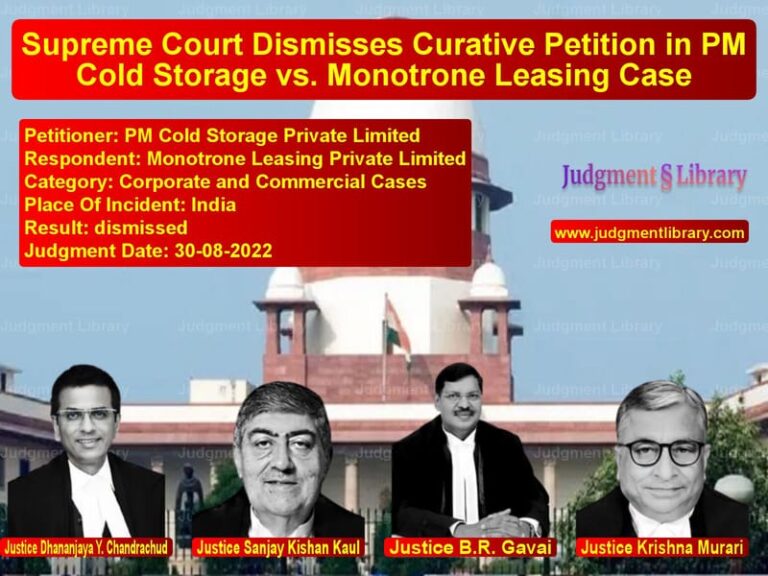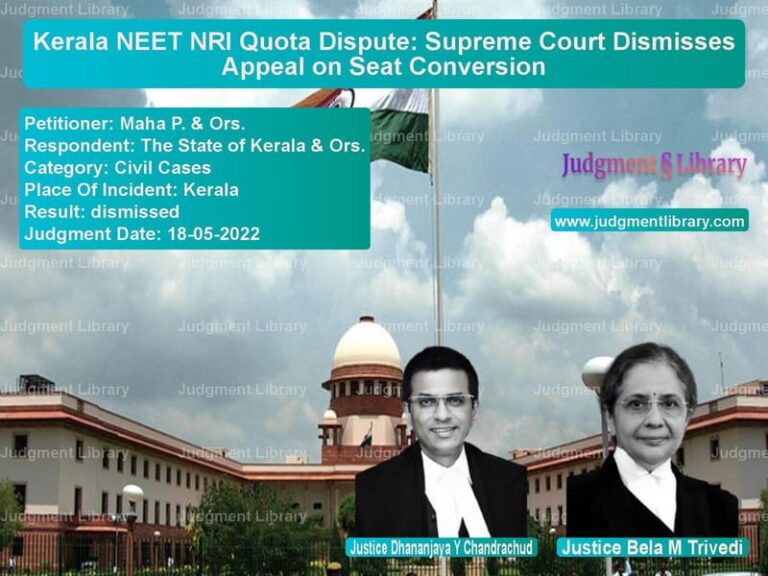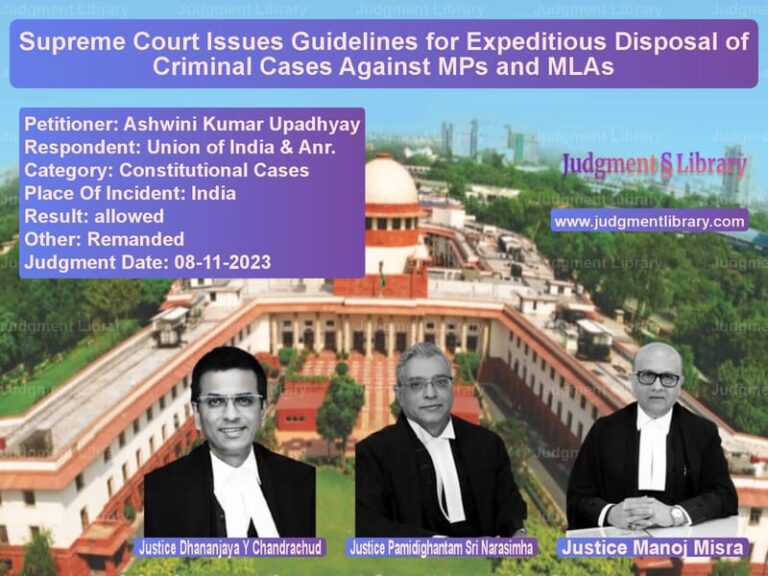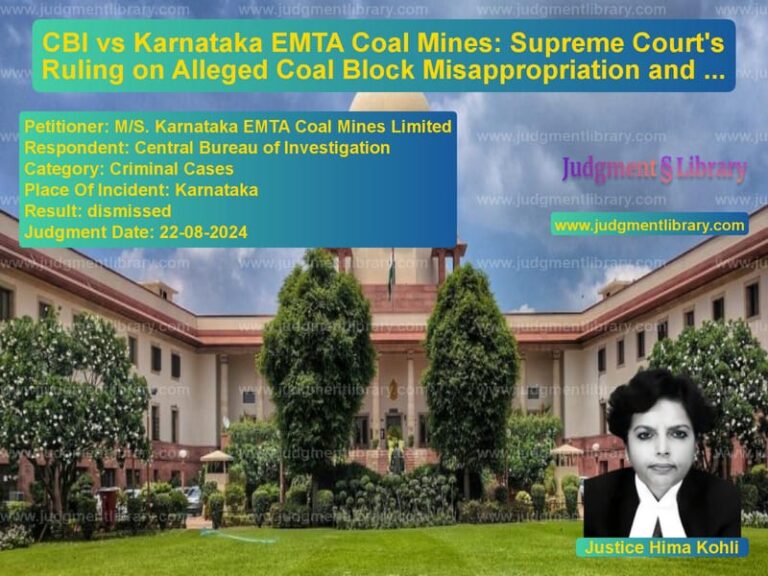Supreme Court Rules on Fraudulent Compensation Claims in Land Acquisition Dispute
On 24th September 2018, the Supreme Court of India delivered a landmark judgment in Satluj Jal Vidyut Nigam Ltd. v. Raj Kumar Rajinder Singh (Dead) Through LRs. & Ors.. The case revolved around **fraudulent claims for compensation** in a **land acquisition dispute** where the claimants sought multiple compensations for the same land through various legal maneuvers.
The Court ruled that compensation **cannot be claimed multiple times for the same land** and emphasized that **fraud vitiates all transactions**. This judgment set a crucial precedent in preventing **misuse of land acquisition laws** and ensuring **government resources are protected from fraudulent claims**.
Background of the Case
The dispute centered around land located in **Shimla and Kinnaur districts of Himachal Pradesh**, previously owned by **Rajinder Singh**. The land had been vested in the **State of Himachal Pradesh** under the **Himachal Pradesh Abolition of Big Landed Estates and Land Reforms Act, 1953**, and later declared **surplus under the H.P. Ceiling on Land Holdings Act, 1972**.
The claimants had already received compensation under the **Abolition Act** and **Ceiling Act**, yet they continued to file fresh claims under the **Land Acquisition Act, 1894**. The land in question was acquired by the **Satluj Jal Vidyut Nigam Ltd. (SJVNL)** for the purpose of **hydroelectric projects**, leading to fresh compensation claims despite previous settlements.
Key Legal Issues Considered
The Supreme Court was tasked with resolving the following legal questions:
- Can **compensation for the same land** be claimed multiple times under different legal provisions?
- Did the claimants engage in **fraudulent misrepresentation** to obtain undue financial benefits?
- What is the impact of **vesting under land reforms laws** on subsequent land acquisition claims?
- What legal principles govern **fraudulent compensation claims** under the **Land Acquisition Act, 1894**?
Arguments by the Appellant (Satluj Jal Vidyut Nigam Ltd.)
The legal representatives of **Satluj Jal Vidyut Nigam Ltd.** made the following arguments:
- The **land had already vested in the State**, and compensation had been paid under **previous legal frameworks**.
- The **claimants had no ownership rights** over the land at the time of acquisition.
- Accepting these claims would set a **dangerous precedent** where individuals could **fraudulently claim compensation multiple times**.
- The **principle of finality in compensation claims** must be upheld to prevent misuse of public funds.
Arguments by the Respondents (Legal Representatives of Rajinder Singh)
The respondents argued:
- They had **legitimate claims** over the land and were **entitled to compensation under the Land Acquisition Act**.
- The previous compensation **did not cover the land acquired for hydroelectric projects**, necessitating **fresh claims**.
- Their **rights had not been extinguished**, and they should be **compensated for loss of property**.
Supreme Court’s Observations
The Supreme Court, comprising **Justice Arun Mishra and Justice S. Abdul Nazeer**, provided a detailed analysis of the **fraudulent nature of the claims** and the **legal implications of multiple compensations**.
On **fraudulent claims**, the Court ruled:
“Fraud vitiates every solemn act. Any order obtained by practicing fraud is a nullity.”
The Court held that the **claimants had already received compensation three times** under different legal provisions, rendering further claims **illegal and unjustified**.
On **finality in compensation claims**, the Court observed:
“Land acquisition laws do not permit multiple compensations for the same land. Compensation once paid must be considered final, barring exceptional circumstances.”
Final Judgment
The Supreme Court ruled in favor of **Satluj Jal Vidyut Nigam Ltd.**, stating:
“The claimants must refund all compensation received fraudulently, with an interest of 12% per annum.”
The Court further directed **state authorities to investigate fraudulent land compensation claims** and ensure such practices are **eliminated in future acquisitions**.
Impact of the Judgment
This judgment has far-reaching implications for **land acquisition laws and public sector projects** in India:
- Prevention of fraudulent claims: The ruling reinforces the **importance of legal integrity** in compensation cases.
- Clarity on multiple compensation claims: The Court reaffirmed that **once land is vested and compensated, further claims are inadmissible**.
- Protection of public funds: The decision ensures that **government resources are not misused** through legal loopholes.
- Accountability in land acquisition: The ruling mandates **stricter checks** to prevent **double compensation claims** in future projects.
This decision sets a **strong precedent against fraudulent compensation practices**, ensuring that **land acquisition laws are applied fairly and transparently**.
Petitioner Name: Satluj Jal Vidyut Nigam Ltd..Respondent Name: Raj Kumar Rajinder Singh (Dead) Through LRs. & Ors..Judgment By: Justice Arun Mishra, Justice S. Abdul Nazeer.Place Of Incident: Himachal Pradesh.Judgment Date: 24-09-2018.
Don’t miss out on the full details! Download the complete judgment in PDF format below and gain valuable insights instantly!
Download Judgment: Satluj Jal Vidyut Ni vs Raj Kumar Rajinder S Supreme Court of India Judgment Dated 24-09-2018.pdf
Direct Downlaod Judgment: Direct downlaod this Judgment
See all petitions in Property Disputes
See all petitions in Landlord-Tenant Disputes
See all petitions in Damages and Compensation
See all petitions in Judgment by Arun Mishra
See all petitions in Judgment by S. Abdul Nazeer
See all petitions in allowed
See all petitions in supreme court of India judgments September 2018
See all petitions in 2018 judgments
See all posts in Civil Cases Category
See all allowed petitions in Civil Cases Category
See all Dismissed petitions in Civil Cases Category
See all partially allowed petitions in Civil Cases Category







